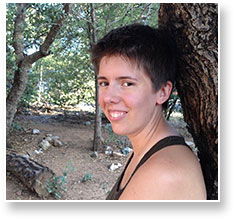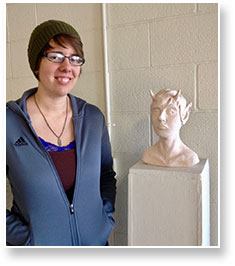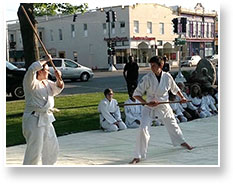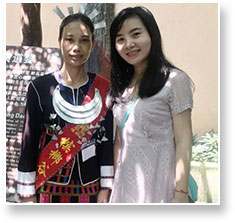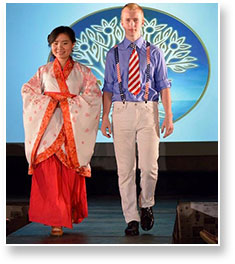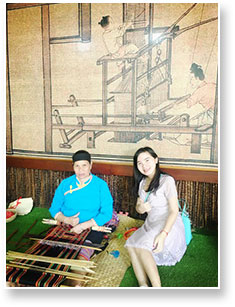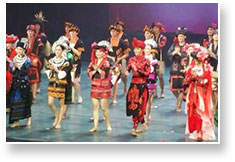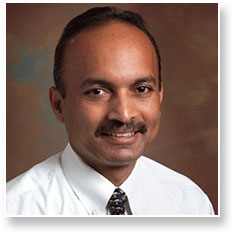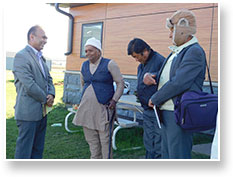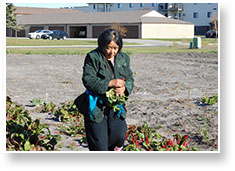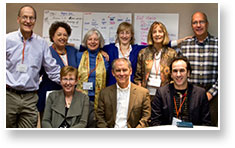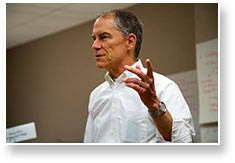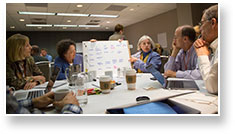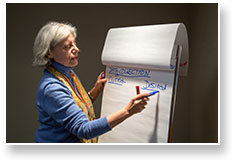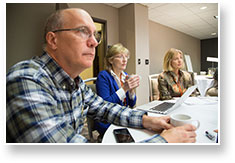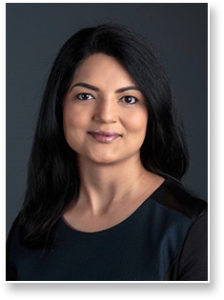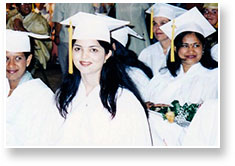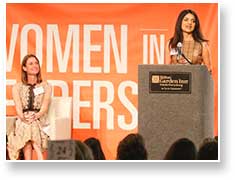Faculty Attend Assessment Academy to Improve Student Learning
A team of eight faculty members attended a three-day Assessment Academy workshop in Chicago at the end of October, joining teams from about 20 other colleges and universities.
The Assessment Academy is a special four-year program offered by the Higher Learning Commission (HLC) to its member institutions. The HLC accredits Maharishi University of Management and more than 1,000 other colleges and universities in 19 states.
“‘Assessment’ is the shorthand term in education referring to an evidence-based system for continuously improving student learning,” said Craig Pearson, vice president of academic affairs at MUM. ”We ask the questions: ’How do we know students are actually learning what we want them to learn?’ and ’How do we continuously improve that learning?’”
The process starts with determining ”student learning outcomes,” Dr. Pearson explained. ”First you decide what knowledge and skills you want your students to gain. Then you create a curriculum aimed to produce these learning outcomes. Then take students through this curriculum. Next you objectively measure, or assess, the degree to which students have achieved the desired outcomes. Then, based on this assessment, you refine your curriculum. And then you take another group of students through it, repeating the process, year after year.’“
This process takes place at three levels: the individual course, the academic program, and the school as a whole.
“Each course has its own student learning outcomes,” Dr. Pearson said. ”But it’s important that those outcomes contribute to the learning outcomes of the academic program as a whole. And every academic program’s learning outcomes should support the university’s overarching learning outcomes. Everything should be aligned at all three levels.”
Several years ago the MUM faculty embarked on a process of defining the university’s overall learning outcomes. ”These represent the knowledge and skills we want every student to have, regardless of what they major in,” Dr. Pearson said. ”We looked at surveys of what employers want college graduates to have. We looked at many other schools’ learning outcomes. And we looked at the expected outcomes of a liberal education. Based on this, we defined our own list, which we call Essential Learning Outcomes, or ELOs.”
MUM’s nine Essential Learning Outcomes include skills in critical thinking, communication, and problem solving, as most schools do. But it also includes an outcome unique to MUM, development of consciousness, as well as health, another important university focus. (See the complete list below.)
“We want students to have abundant opportunities to exercise and strengthen these vital skills throughout their time here and to build the foundation for a successful professional and personal life,” said Dr. Chris Jones, dean of academic programs and leader of the team.
At the course level, faculty leaders introduced a new chart to be part of every class syllabus. These “student learning charts” graphically display three things: what students are expected to learn, how they will learn it, and how they will demonstrate they have learned it. They also show how the course learning outcomes connect to the Essential Learning Outcomes, so that students and faculty always have the larger learning goals in front of them. The faculty have now been trained in creating and using these charts.
Quality Initiative
MUM enrolled in HLC’s Assessment Academy to benefit from the guidance of experts in student learning and assessment. The academy also gives MUM access to its Collaboration Network, so that MUM academic leaders can look at and benefit from what hundreds of other schools are doing in their own assessment work.
MUM is in HLC’s Open Pathway accreditation track, which is for mature institutions and by HLC invitation only. Colleges and universities in this track choose a ”quality initiative” they commit to working on over a 10-year accreditation cycle. Schools are encouraged to choose a stretch goal for this initiative.
“After considering a number of options, we chose assessment,” Dr. Pearson said. ”Having a system for continuously improving student learning is bedrock in higher education.”
MUM’s next accreditation visit will be in 2020. Among other things, the visiting team will review MUM’s Quality Initiative.
At October’s workshop in Chicago, all the schools that had enrolled in the Assessment Academy two years ago came together to review their original plans, assess their progress so far, and develop detailed plans for the final two years. The workshop also featured presentations, feedback, and mentoring from assessment experts.
MUM’s Nine Essential Learning Outcomes
1. Development of consciousness
2. Health
3. Holistic thinking
4. Creativity
5. Critical thinking
6. Communication
7. Problem solving
8. Teamwork and leadership
9. Local and global citizenship.

